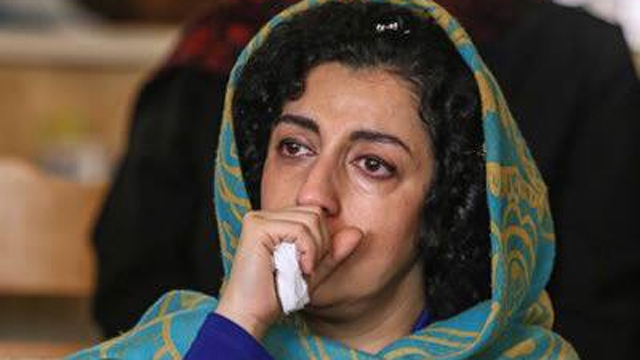In Unprecedented Public Plea MPs Call on Judiciary to Reverse Narges Mohammadi’s Prison Sentence
 Fifteen Iranian members of Parliament have called on the Judiciary to reverse the 10-year prison sentence of prominent human rights defender Narges Mohammadi, marking the first time since the Iranian revolution in 1979 that lawmakers publicly defended a person convicted of anti-state activities.
Fifteen Iranian members of Parliament have called on the Judiciary to reverse the 10-year prison sentence of prominent human rights defender Narges Mohammadi, marking the first time since the Iranian revolution in 1979 that lawmakers publicly defended a person convicted of anti-state activities.
“We plead with you to show Islamic mercy and nullify the sentence and order a new trial,” said the MPs in a letter to Judiciary Chief Ayatollah Sadegh Larijani on October 16, 2016. “Your Excellency is aware that issuing such sentences against critics would only raise the cost of constructive criticism, isolate critics and drive society into stagnation.”
“There’s only two ways two change the sentence against my client,” said Mohammadi’s lawyer, Mahmoud Behzadi, in an interview with the International Campaign for Human Rights in Iran. “One way would be for the judiciary chief (Sadegh Larijani) to respond positively to the letter from the MPs and step into this case. If Mr. Larijani finds the sentence in violation of the law and refers it to a new court for review, then we can be hopeful that the sentence would be thrown out. Another way would be for our defense team to put in an appeal with the Supreme Court.”
In their letter to the judiciary chief, the MPs described Mohammadi as a person who “has for years worked for women’s rights” and reminded him that even though she was behind bars in Evin Prison, she had shown good will towards the Islamic Republic by calling on people to participate in the last parliamentary election in February 2016, “which showed she cares dearly for our dear country.”
Pointing out that Mohammadi, the mother of two young children, was suffering from various life-threatening illnesses, the MPs said: “We ask your Excellency, as the highest judicial authority of the country, to personally intervene in this case and once again show the world the mercy and benevolence of the Islamic Republic by your kind action.”
Larijani has not responded to the MPs’ request, but would likely reject it if he did respond.
“Recently some Members of Parliament have signed a letter to the judiciary chief and supported individuals who are part of an evil triangle,” said Prosecutor General Mohammad Jafar Montazeri on October 18, in response to the MPs’ letter. Montazeri added that the MPs should have investigated Mohammadi’s case “before defending outcasts.”
Mohammadi’s lawyer told the Campaign that she could be released from prison in less than six months if her latest conviction was overturned.
“We hope she will be exonerated because she was only a member of the Step by Step to Stop the Death Penalty organization, not it’s founder, and therefore she doesn’t deserve a 16-year prison sentence,” said Behzadi. “If the sentence is reversed, my client will go free on March 4, 2017. If not, she would begin serving at least 10 years in prison from that day.”
In September 2016 the Appeals Court upheld Mohammdi’s 16-year prison sentence, of which she must serve 10 years, for “membership in the (now banned) Step by Step to Stop the Death Penalty” organization, “assembly and collusion against national security,” and “propaganda against the state.”
The MPs who signed the letter included Parvaneh Mafi, Ali Motahhari, Alireza Mahjoub, Soheila Jelodarzadeh, Fatemeh Zolghadr, Nahid Tajeddin, Hamideh Zarabadi, Parvaneh Salahshouri, Ahmad Mazani, Hajar Chenarani, Alireza Rahimi, Fatemeh Saeedi, Tayebeh Siavoshi Shahenayati and Mahmoud Sadeghi.
“We signed this letter without fear in line with the mercy shown by the supreme leader and the Judiciary towards other cases,” said Cenarani on October 20, 2016, according to a report in the reformist Shargh newspaper. “We have asked the Judiciary to reconsider the verdict against her, considering her physical condition and the fact that she is a mother.”






